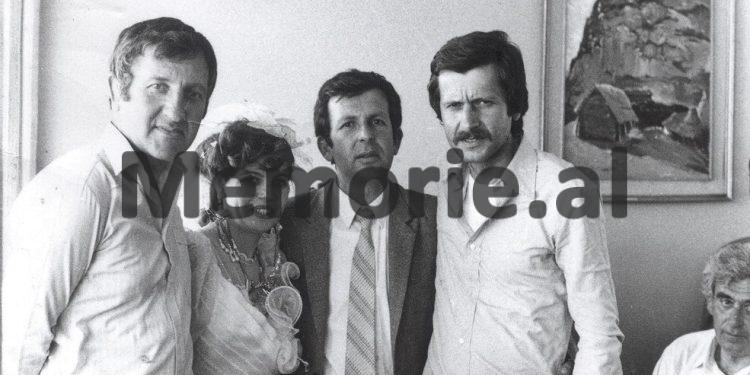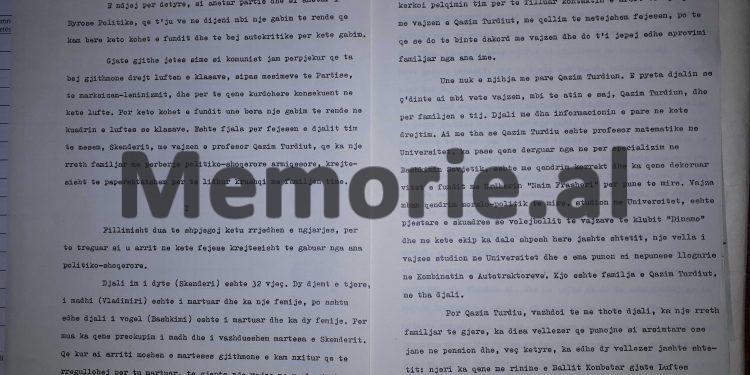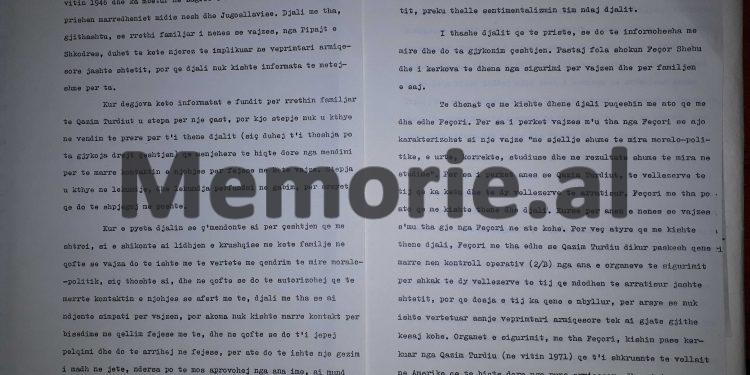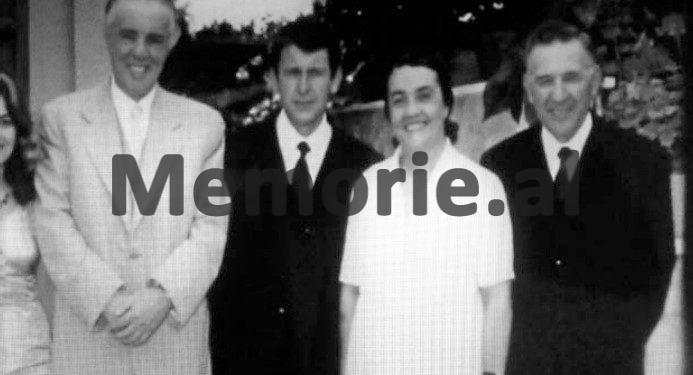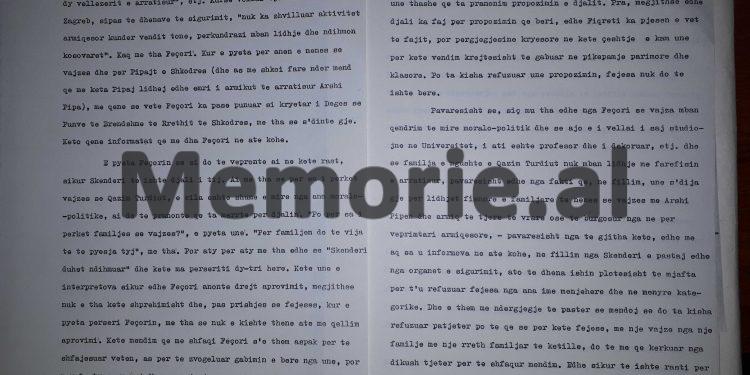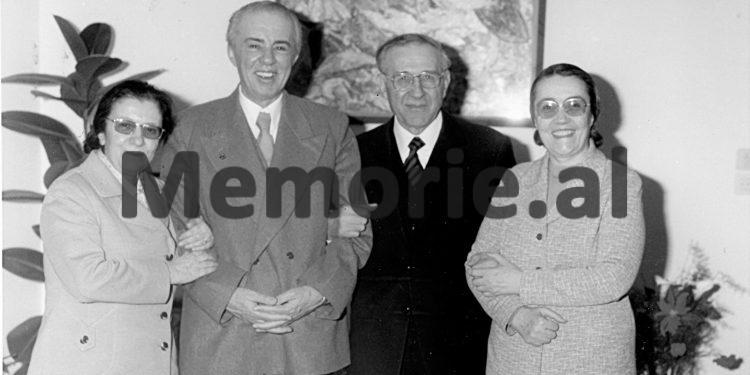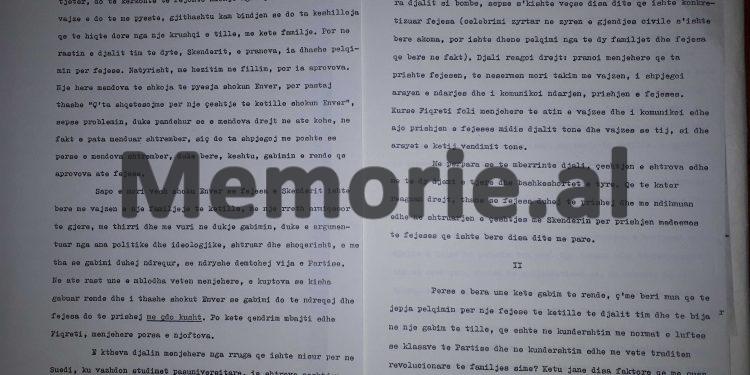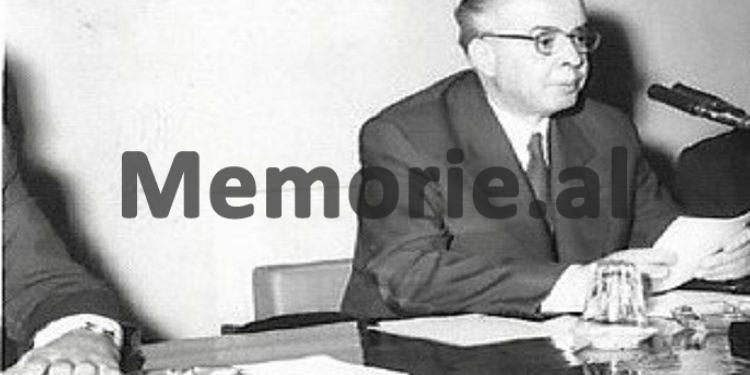Dashnor Kaloçi
Part sixteen
Memorie.al publishes some documents issued by the Central State Archive (fund of the former Central Committee of the ALP), where there is a voluminous file with archival materials which bear the logo ‘Top secret’, which belong to the period of years 1981-1982, with reports, reports, evidence, information, minutes of the meetings of the Politburo and the secretariat of the Central Committee of the ALP, etc., starting from what was held to review and analyze the self-criticism of the former Prime Minister Mehmet Shehu in December 1981, because he had allowed the engagement of his son, Skënder, “with a girl who had some political fugitives in her family circle”, the marathon meeting of the Politburo on the afternoon of December 17 his year that lasted until the late hours of that night, where that problem was discussed with the debates and discussions of all members who “crucified” former Prime Minister Shehu, the meeting of the morning of December 18, after the news that Prime Minister Mehme Shehu had killed himself, the marathon meeting of the Secretariat of the Central Committee of the ALP on September 20, 1982, with the topic: “Analysis of serious mistakes of Kadri Hazbiu, committed during the period when he was deputy minister and minister of Internal Affairs “, where Enver Hoxha initially launched accusations against Kadri Hazbiu, luring him as a” loyalist of the Party “, (in order for him to” open the heart of the Party “, speaking against former Prime Minister Mehmet Shehu) , where at the beginning of his speech, Enver said: “After the coup in the army, we discovered the traitorous group in economics of Abdyl Këllez, Koço Theodhos and Kiço Ngjela with friends. We also discovered this group here; it was not discovered by the State Security. The same can be said about the discovery of the group of Fadil Paçrami, Todi Lubonja and a number of other people connected with them, such as Ismail Kadareja with friends, the Security did not reveal, but that hostile work was discovered by the Committee Central ”, etc.! All these and other documents with the logo ‘Top secret’, will be published in several issues in a row, exclusively by Memorie.al
Continued from the previous issue
The ‘Top secret’ document with the self-criticism of former Prime Minister Mehmet Shehu, sent to Enver Hoxha and the Political Bureau of the Central Committee of the ALP, regarding the engagement of his son, Skënder, to “a girl with a very bad political composition”!
Top secret
“Draft-self-criticism” (“First self-criticism”) that Mehmet Shehu sent to comrade Enver Hoxha and “Autocriticism” (second variant) to comrade Enver Hoxha and comrades of the Politburo of the Central Committee as well as the minutes of the meeting Politburo of the Central Committee of the ALP, dated 17 – 18 December 1981: For the analysis of the serious mistake made by the former member of the Politburo, Mehmet Shehu, regarding the engagement of a boy with a girl with a very bad political composition . (Dt. 17-18. XII. 1981)
I feel it my duty as a member of the Party, and as a member of the Politburo, to inform you of a grave mistake I have made recently, and to make a self-criticism of this mistake. Throughout my life as a communist, I have always tried to make the class struggle straight, according to the teachings of the Party, of Marxism-Leninism, and to always be consistent in this struggle.
But lately, I’m making a serious mistake in the context of the class struggle. It is about the engagement of my middle son Skënder, with the daughter of Professor Qazim Turdiu, who has a family circle with a hostile political and social composition, completely unsuitable to be related to my family.
First, I want to explain the course of events here, to show how this completely politically and socially wrong engagement was reached. My second son, Skënderi, is 32 years old. The other two sons, namely the elder Vladimir, are married and have one child. Likewise the little boy, Bashkim, is married and has two children. For me, Skënder’s marriage has been a great and constant preoccupation.
Ever since he reached the age of marriage, I have always encouraged him to arrange to get married, to find a girl with good moral-political and social make-up in the first place and above all. In the summer of this year, Skënderi came with a proposal and asked for my consent to start close acquaintance contact with Qazim Turdiu’s daughter, with the aim of further engagement, if he would agree with the girl; he would ‘was also given family approval by me.
I did not know Qazim Turdi before. I asked the boy what he knew about the girl herself, her father Qazim Turdi, and his family. Boy gave me the first information in this regard. He told me that: Qazim Turdiu is a professor of mathematics at the University, he was sent by us with specialization in the Soviet Union, he has a correct attitude and, in recent years he has been decorated with the order “Naim Frashëri” for good work.
The girl, has a good moral-political attitude, studies at the University, is a member of the girls’ volleyball team of “Dinamo”, and with this team has often gone abroad. One of her brothers studies at the University, while her mother works as an accountant at the Tractor Factory. This is Qazim Turdiu’s family, my son told me. But Qazim Turdiu, Skënderi told me, has a large family circle, his brothers work as teachers or have retired. In addition, he has two brothers abroad.
One was with the youth of the ‘National Front’ during the years of the National Liberation War, and after its end he fled to the USA, where he is today. His other brother was sent by us to study in Yugoslavia in 1946. He stayed in Zagreb and has not come since we broke up with Yugoslavia. The boy also told me that, from the family circle of the girl’s mother, from Pipaj of Shkodra, there must have been people implicated in hostile activities abroad, but that the boy had no further information about them.
When I heard this latest information about Qazim Turdiu’s family, I was shocked for a moment. But this steppe did not turn into a decisive decision to tell the boy (as I should have told him, if I was judging the case correctly) to immediately give up the thought of getting in touch with the acquaintance for the engagement, with this girl. Steppe, turned to oscillation, and the oscillation ended in error for the reasons I will explain below. When I asked the boy what he thought of the issue he raised, how he viewed the family relationship with this family, if the girl would be really in a good moral-political attitude as he said, and if she would was authorized to take contact of close acquaintance with her, the boy told me that he felt sympathy for the girl, but had not yet made contact, with the intention of betrothal to her.
And if the consent was given to him and the engagement was reached, it would be a great joy in life for him. While if he approved of me, he could even give up, because the latter told me, for him “marriage may not even become a problem at all”. This last expression I put in quotes, which the boy had said before to Fiqret, deeply touched my sentimentality towards the boy. I told the boy to wait, that I would be better informed, and we would judge the matter.
Then I talked to my friend Feçor Shehu, and asked him for information from the Security about the girl and her family. The information given to me by my son matched the information given to me by Feçori. As for the girl, I was told by Feçori that she is characterized as a person with very good moral-political behavior, wise, correct, scholarly, and with very good results in studies. As for Qazim Turdi, and the side of his brothers here, and the two fugitive brothers, Feçori told me the same things that my son had told me. As for her mother’s side, nothing was said to me by Feçori at that time.
But apart from what my son told me, Feçori told me that, once Qazim Turdiu was under operational control 2 / B, by the Security organs, because of his brothers who have fled abroad. But his file has been closed because no hostile activity was proven against him during all this time. The security organs, Feçori told me, had asked Qazim Turdiu in 1971 to write to his brother in America, to give up hostile work, and he had written him a letter, but his brother had continued the hostile work. , e “Qazimi and his brothers, did not have relations with the two fugitive brothers”, etc.
Qazimi’s other brother in Zagreb, according to Security data, “has not carried out hostile activity against our country, on the contrary, he maintains ties and helps Kosovars”. That’s what Feçori told me. When I asked him about the girl’s mother’s side and about the Pipajs of Shkodra (and I do not even think that the name of the fugitive enemy, Arshi Pipa, was associated with these Pipajs), since Feçori himself worked as the Head of the Affairs Branch Interior of the Shkodra district, told me he knew nothing. This was the information that Feçori gave me at that time.
I asked Feçor how he would act in this case, as if Skënder were his son. He told me that: as for Qazim Turdiu’s daughter, who is very good morally and politically, he would agree to take her for the boy. “What about the girl’s family?” I asked. “I would come to ask you about your family,” he told me. But immediately he also told me that “Skënderi, we must help” and he repeated this to me two or three times.
I interpreted this as if Feçori was leaning towards approval, although he did not say this explicitly and after the break-up of the engagement, when I asked Feçori again, he told me that he had not said it for the purpose of approval. This opinion that Feçori showed me, that I do not say at all to justify myself, nor to reduce the mistake made by me, but, to show the course of events, to show how I fell into this mistake.
That was the situation before I decided. I discussed the issue with Fiqret. Fiqrtet shook, hesitated. But finally, I said to accept the boy’s proposal. So, although the boy is also to blame for the proposal he made, Fiqret also has his share of guilt, but I have the main responsibility in this matter, for this decision that is completely wrong in principle and class. If I had rejected the proposal, the engagement would not have taken place.
Despite the fact that, as I was also told by Feçori, that the girl has a moral-political attitude and that she and her brother study at university, that her father is a professor and decorated, etc., and that Qazim Turdiu’s close family has no connection with the fugitive relative, despite the fact that, at first, I knew nothing about the tribal and family ties of the girl’s mother, with Arshi Pipë and other enemies, killed or imprisoned by us, for activities hostile, – despite all this, even as far as I was informed at the time, first by Skënder, and then by the Security organs, those data were completely sufficient to refuse my engagement, immediately and categorically.
And I say with a clear conscience that I think I would have definitely rejected it, if for this engagement with a girl from a family with such a family circle, I would have been asked by someone else, to express an opinion. Even if it were the case for each of my other two children, that if they were unmarried and asked to be engaged to this girl, I am convinced that I would not approve of them. Even if any of my brothers, or anyone else, would ask to betroth one of his sons to this girl, and would ask me, I am also convinced that I would advise him to give up such a marriage, with this family.
But in the case of my second son, Skënder, I accepted, I gave his consent for the engagement. Of course I hesitated at first, but I approved. Once, I thought of going to ask Comrade Enver, but then I said, “What worries me about such an issue, Comrade Enver,” because the problem, assuming I thought it right at the time, I actually thought crookedly, as I would explain below why I thought it was wrong, thus making the grave mistake of approving this betrothal.
As soon as Comrade Enver found out that Skënder’s engagement had been made to the daughter of such a family, with a wide hostile circle, he called me and pointed out my mistake, arguing it politically and ideologically, openly and socially, and told me that the mistake had to be corrected, that otherwise the Party line would be damaged. In that case, I collected myself immediately, realized that I had made a serious mistake, and told Comrade Enver that the mistake would be rectified and the engagement would be broken, at all costs. Fiqreti held the same attitude as soon as I informed him.
I immediately returned the boy from the road that had started to Sweden, where he continues his postgraduate studies, I raised the issue extensively politically and ideologically, I pointed out his mistake, but also my and Fiqret’s fault. Of course, this fell like a bomb on the boy, because the engagement had been concretized for only a few days (the official celebration in the civil status office had not taken place yet, but the consent of both families had been given and the engagement had actually taken place).
The boy reacted correctly: he immediately agreed to terminate the engagement, the next day he met with the girl, explained the reason for the separation and communicated to her, the dissolution of the engagement. Fiqret, on the other hand, immediately spoke to the girl’s father and communicated to him the break-up of the engagement between our son and his daughter, as well as the reasons for our decision.
Before the boy arrived, I raised the issue with the other two boys and their wives. All four reacted correctly, saying that the engagement should be broken and they also helped me in raising the issue with Skënder, the immediate breaking of the engagement he had made a few days ago.
Why did I make this grave mistake, what made me consent to such an engagement of my son and daughter in such a mistake, which is contrary to the norms of class warfare, party and in contradiction even with my own family’s revolutionary tradition? Here are some factors that led me to this mistake. Memorie.al
The next issue follows




